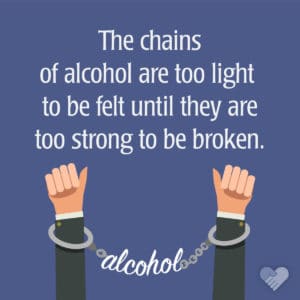Search by category, archive or keyword

One of the biggest misconceptions about alcoholism is that it takes a long time to take effect. Many believe that serious health concerns about alcoholism require years of drinking before a full addiction and alcoholism can occur.
Alcoholism is a Progressive Disease
Admitted alcoholics will tell you their alcoholism dates from the earliest days of their drinking; it just took years to admit their alcoholism. Some alcoholics will even admit that the first time they got drunk, they knew their drinking was going to be a problem – but denial prevented them from admitting to themselves just how bad it could get.
The Progression of Alcohol Abuse to Alcoholism
Using Alcohol to Manage Mood, Stress, or Anxiety
55%
When Alcohol Begins to Control Your Life
There is a saying that goes, “alcohol creates a need for itself,” an idea that is very familiar to alcoholics. With alcohol dependence, alcohol rules everything in one’s life and determines what one does. Daily behaviors are controlled by the need for alcohol. As such, alcohol is in control, not the alcoholic.
At this point, an alcoholic won’t engage in activities or go out with friends and family if it hampers the ability to access alcohol. The alcoholic’s whole life revolves around a schedule designed to keep an adequate level of alcohol in the bloodstream and to minimize symptoms of alcohol withdrawal. To others, it becomes obvious that alcohol is in control of the alcoholic’s life, but the alcoholic feels he or she is successful in managing the problem.

End-Stage Alcoholism
Generally fatal, end-stage alcoholism is marked by significant health problems and the inability to quit drinking – even with all the health problems being experienced. Heart and liver problems, pancreatic issues, and cognitive issues are common at this point, and alcoholics are usually given final, desperate warnings by their doctors that alcohol will kill them. A decision must be made by alcoholics: will they allow alcohol to kill them, or will they fight to survive and quit drinking?
If an individual quits drinking, there may still be hope. If an alcoholic cannot quit drinking, even at the end stage, a sad and slow death ensues.
Dying from Alcoholism is the Hardest Thing a Family Member Will Ever Have to Witness
Losing a family member to a terminal, progressive disease can rip right through the soul. Seeing a loved one struggling to stay alive while the body gives out is heart-wrenching and frightening. Many families have to watch a family member die from various terminal illnesses such as cancer, Alzheimer’s, and leukemia. These diseases are agonizing, too, but end-stage alcoholism is truly a horrendous end to the gift of life.
Families That Lose a Loved One to Alcoholism
After a loved one dies from alcoholism, families experience significant grief, and the most common things that family members say afterward are:
“If only we had acted sooner to get him help.”
“He said he had it under control; why did we believe that?”
“What more could we have done that would have saved him?”
Families often blame themselves for the death of a loved one from alcoholism, but the family and friends of alcoholics should not blame themselves. As long as families have done everything to make help accessible to the alcoholic, then they have done what they can to help turn their loved one’s life around.
All that families can do is provide their alcoholic loved ones with an opportunity to help themselves. The most important thing not to do is enable the addiction, i.e., make it easy to continue drinking as the loved ones continue edging toward end-stage alcoholism.
The Dangers of Enabling Alcoholism
Counterintuitively, families sometimes enable their loved one’s addiction out of love, believing they are helping. Enabling alcohol addiction is not helping, even though motherly and fatherly instincts would seem to indicate it.
While the idea of enabling alcoholism can be difficult for families to recognize and address, it is something that MUST be addressed. If families continue to enable their loved one’s alcohol abuse, even when they are slowly killing themselves with their drinking, then the families are contributing to their death.
Those words may sound harsh, but they are truthful. Enabling an addiction does not benefit the welfare of the loved one. Rather, it lessens the chance that a change in lifestyle can occur. In cases of alcohol addiction, no change in lifestyle can easily lead to death.
How Family First Intervention Can Help a Loved One in Danger of Dying from Alcohol
When we work with families on alcohol interventions, we look at the big question: “Why hasn’t this person received treatment?” Why hasn’t this person been able to recover? What are the roadblocks impeding sobriety, and why does the prospect of drinking to death seem to be this person’s only choice?”
When dealing with the risk of alcoholism progressing into the end stage, we aim to remove roadblocks to recovery, obstacles such as enabling behaviors, guilt and shame, and underlying conditions that have prevented recovery in the past. Serious alcoholism must be dealt with as an emergency situation, and our certified interventionist professionals can help your family deal with this emergency before it is too late.
Call Now to Speak with an Interventionist: 1 (888) 291-8514
YOUR NEXT STEPS…
Where Do You Go from Here?
Contact Us to Speak with a Certified Interventionist
An intervention is not about how to control the substance user; it is about how to let go of believing you can.
“The most formidable challenge we professionals face is families not accepting our suggested solutions. Rather, they only hear us challenging theirs. Interventions are as much about families letting go of old ideas as they are about being open to new ones. Before a family can do something about the problem, they must stop allowing the problem to persist. These same thoughts and principles apply to your loved one in need of help.”
Mike Loverde, MHS, CIP



